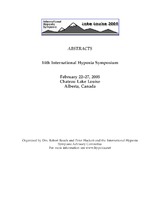Offspring of preeclamptic mothers are predisposed to hypoxic pulmonary hypertension
Fecha
2005-02-22Autor
Sartori, Claudio
Jayet, Pierre-Yves
Thalmann, Sebastien
Stuber, Thomas
Hutter, Damian
Salinas Salmón, Carlos E
Cucchia, Celine
Rodriguez, Armando
Riveros, Loyola
Spielvogel, Hilde
Allemann, Yves
Villena, Mercedes
Scherrer, Urs
Metadatos
Mostrar el registro completo del ítemResumen
Adverse events in utero may predispose to cardiovascular disease in adulthood. In preeclampsia, the diseased placenta releases circulating vasculotoxic factors
that cause maternal endothelial dysfunction. These factors may pass the placental barrier, and leave a persistent vascular imprint that may predispose to a pathological response in later life. Endothelial dysfunction
plays a major role in the pathogenesis of hypoxic pulmonary hypertension. We hypothesized that offspring
of pre-eclampsia may be predisposed to pulmonary hypertension at high altitude. To test this hypothesis, we
measured systolic pulmonary-artery pressure (echocardiography) in 11 young (age, 7 1 years, X SE)
healthy Bolivian offspring of preeclampsia, and in 13
sex- and age-matched offspring of normal pregnancies
in La Paz (3600 m). The major new finding was that systolic pulmonary-artery pressure was roughly 33 percent
higher in offspring of preeclamptic mothers than in control subjects (36 2 vs. 27 1 mmHg, P 0.001). This
exaggerated hypoxic pulmonary vasoconstriction was
not related to more severe hypoxemia or exaggerated
polyglobulia. These findings provide the very first evidence that preeclampsia leaves a persistent and potentially fatal imprint in the pulmonary circulation of the
offspring, which predisposes them to exaggerated hypoxic pulmonary hypertension in later life.

